Fujino Omori’s first ranobe (light novel) Is It Wrong to Try to Pick Up Girls in a Dungeon? has sold more than 3.7 million copies since its debut in 2013. An anime version of the ranobe (literally formed from the English words “light” and “novel”) appeared in April 2015, and was enthusiastically received both at home and abroad. The original ranobe version was ranked high in the top 10 by the New York Times Best Sellers list in the manga genre — the U.S. newspaper combines manga and ranobe works in this genre. To learn more about the appeal of the novel that became such a hit, writer Momo Tachibana interviewed the author.
A boy named Bell Cranel courageously visits a dungeon within the huge labyrinth of Orario out of a lurid urge to “pick up girls.” The novel Is It Wrong to Try to Pick Up Girls in a Dungeon? — also known as DanMachi — is a genuine role-playing game (RPG) novel, featuring Bell and Hestia, a goddess with two black pigtails and big boobs. You initially posted the original version of the novel on the Arcadia online novels site. After revising the online version, you applied for the GA Bunko Award, won the grand prize and debuted as a novelist.
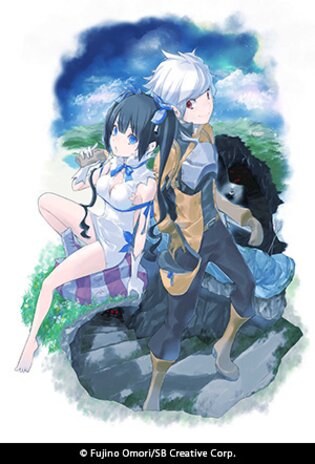
Omori: To tell the truth, I’m the type of person who really dislikes reading and writing. When I was a primary school student, I wasn’t good at writing. What I hated most was a homework assignment where I had to read a book and write what I thought about the content. When I had to write my impression about [Osamu Dazai’s] book Run, Melos! I just copied down parts of the book. Of course, my teacher was angry. I mostly read manga works. When I was a middle school student, it was common for virtually every household to have a personal computer. My family also got a PC. As I became interested in the Internet, I learned about web novels. I found them easy to read even for a person like me who disliked reading. I was excited to learn that interesting things were available online for free. I couldn’t stop reading Reki Kawahara’s Sword Art Online, which was posted online by Kawahara-sensei before he made his commercial debut. I was so excited by the novel series that I knew I had to write something myself. I actually began writing my own novel when I was a university student. It was DanMachi.
You were smitten by the universal nature of the literature. But wasn’t it difficult for you to put the urge to write novels into practice as you had no expertise of this kind at the time?
Omori: The main impulse for me to start using the Internet was the inspiration I got from the very last scene of the TV anime series Neon Genesis Evangelion. I wanted to know more about it. I read as many online articles as possible about it. Shortly after that, I learned there was a novel version of Evangelion, an offshoot of the original work. Of course, I read it, although I still disliked reading. I found it easy to read because it was not very long and I already had a sort of affinity with the world depicted in the anime series. Later on, I actually became interested in reading original novels. While reading them, I told myself, “If I were the author of this book, I would present this part in this way or that way.” I really became interested in reading novels that were engrossing in many ways. The first novel I wrote was a kind of secondary work. Later, I started looking forward to writing the type of novel that I personally wanted to read.
In your early years, you never expected to become a novelist. However, you later became so keen to create works that would give readers the same incentive you received from the web novels you read. You were driven by the urge to write novels that would excite no one but yourself at first.
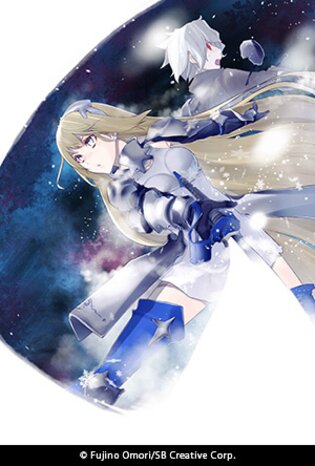
Omori One day, when I was jogging, I suddenly imagined a scene in which a faceless protagonist was fighting Minotaurs. At the time, I had not yet thought of the plot of the novel or its characters. “I’ll definitely write this powerful scene,” I told myself. The reason I adopted the setting of a dungeon was simple — dungeons were a central theme of web novels in those days. I felt that a dungeon should have Minotaurs. I think I was influenced by the fad at the time.
In addition to the Minotaurs, various characters — deities — are based on those in Norse, Greek and Japanese mythologies. These deities become bored with the heavenly world and join human beings in the real world to form “Familia” factions by keeping their natural deity capabilities dormant. This setting in DanMachi in which the deities think, live and act as humans is one aspect of the appeal of the novel. The deities and humans join up in their dungeon adventures. The novel therefore is full of respect for the RPG culture of the good old days and proves you are knowledgeable about various myths.
Omori: To be honest, I had almost no experience of playing video games in my early years. My brother did not allow me to play the Dragon Quest video game because he was afraid that as an inexperienced player I would cause the system to break down and delete his adventure book (save file). My real RPG experience began only after the PlayStation console using memory cards was introduced. Only on a few occasions, I played Final Fantasy VII and Fire Emblem games. As a result, when I began writing DanMachi, I was still a newcomer to the video game world. I mean I had virtually no understanding of the fantasy behind video games. Neither did I know what RPG meant.
But as I read dungeon-centric web novels, I asked myself from time to time, “Isn’t it strange to stick to and apply the distinctions of this world to the fantasy of different worlds? Shouldn’t we create fantasy worlds with settings and features that are unique to such different worlds?” When I played video games, I became ecstatic when I was able to increase my level as a player whose hero built up his skills. How could I depict such euphoria in a novel? I suddenly had an idea — deities should appear in it! I thought: “While humans commit themselves to adventures, deities enjoy them as a sport. So it may be possible to rank humans according to a system governing deities.” Up until then, I had almost no knowledge about myths, of course, due to my dislike of reading. Therefore, I gradually learned about myths day by day by writing down everything I had seen. I used the comment columns on the sites of novels to: “Please tell me what kind of monsters appear in fantasyland?” Incidentally, I found the web novel contribution system helpful in my research and writing style as I was required to post up to the equivalent of about 10 pages of a paperback each time.
Anyway, I was preoccupied with thought of the spur of the moment — featuring Minotaurs in a novel. I felt really happy as I received the largest ever number of responses when I posted a scene in which a Minotaur appeared for the first time. I was particularly happy because readers loved reading what I really wanted to write to entertain myself. It was a very special experience — I remain really encouraged even now by those responses.
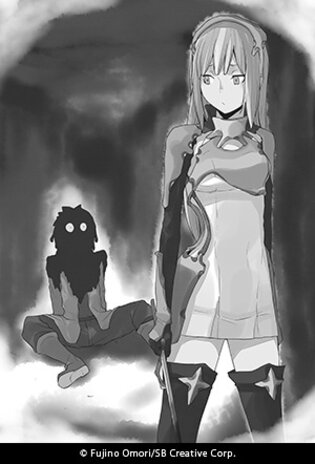
—Though the title may give the impression that the hero is surrounded by cute girls in a setting common to novels depicting harems, the main thrust of the DanMachi story is the development of the hero as an adventurer, from beginning to end. Bell is a person who keeps getting turned away at the door of each “Familia” group. He is a nobody without any particular skills or abilities. At the outset of the novel, Bell is so weak that he has to be rescued by Ais Wallenstein, the blonde heroine nicknamed the “Sword Princess.” Nonetheless, readers empathize with Bell because of his refusal to back down from a fight.
Omori: Readers may be excited by a powerful hero who overwhelms one monster after another. But I never thought of writing a novel with such a perfect hero. I thought a dungeon should be a place that was far more dreadful than we imagined. Therefore, I thought I would have to make my hero face a terrible environment or my novel would lack any sense of reality. At the same time, I did not want my hero to suddenly become all-powerful every time he was driven into a corner. I decided that his strength should gradually increase as he confronted one menace after another. For this reason, even though Minotaurs were the first characters I thought of, I had to write two volumes without the appearance of a Minotaur. The monster finally appeared in the third volume. Some readers were not happy with the slow pace of the story development. But I’m still grateful that I was given the opportunity to spend sufficient time to create the series.
In the first volume, Bell is insulted in front of Ais — the girl of his dreams — as a “wimpy, incompetent, aggressive-yet-ineffective, small-fry bastard.” Bell is so mortified and wretched that he throws himself into the dungeon. In despair, he whispers to himself, “I want to be strong.” This is a compelling scene, and gives great meaning to the showdown in the third volume.
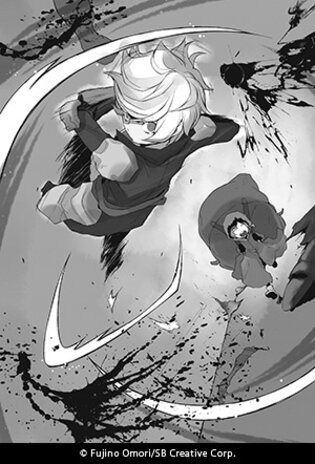
Omori: I myself have led a life with little chance of winning in relative terms, but in my case my frustration over a setback or defeat always becomes a motivation to strive harder. It’s true that my inferiority complex is reflected in the hero. The first skill Bell acquires is named “Liaris Freese,” an ability that enables him to become stronger as he longs more for Ais, whom Bell falls in love with at first sight. But Bell may have been actually motivated by werewolf Bete Loga who belittles the hero in front of Ais. When your pride takes a pounding, it must be a really miserable experience, but that kind of experience is, I think, necessary for our development. You feel dwarfed whenever you are in the presence of a person who is far superior to you in every sense of the word. Therefore, you feel ashamed of yourself even though that person has no intention at all to harm you. But when you run into difficulty the next time, such vexation can become useful as you can squarely confront it. In the fifth volume, Bell’s grandfather, who brought him up, appears. He tells his grandson, “Disheartened? Never mind. Discouraged? Forget it. Just cry a lot. A winner is always within a loser.” The words of the grandfather, I think, reflect what I have in mind, which I wanted a character in the novel to convey on my behalf. I wanted Bell to be this kind of a hero. Perhaps I expected him to realize what I had earlier given up doing or pursuing.
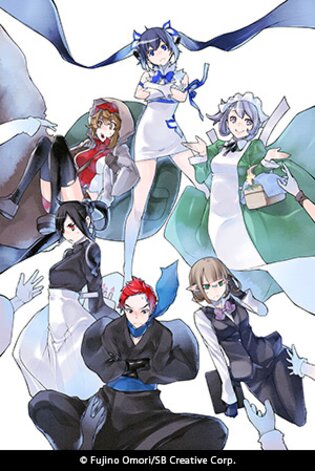
Not only Bell but all of the heroines, including the goddess Hestia, have inferiority complexes and worries of their own. Bell is straightforward in helping them when they’re in trouble — therefore he acts as a savior for each of the heroines. That is why those heroines fall in love with him. All those characters eventually form a Familia group, as if fostering family ties.
Omori: As the hero becomes more skillful, the number of his allies increases one by one as time goes by. This is the very thrill of RPG novel writing. After writing about the scenes in which Minotaurs appear to fight Bell, I wanted to write a scene in which all of those who helped Bell get together. Then, I wanted to write cathartic episodes that affected each of those Familia members. Consequently, all of those members are given the opportunity to get together only in the sixth volume.
As I created in-depth episodes for all of them, the world of my story kept expanding, allowing me to think of more things to include in the novel. I therefore detoured frequently as if I myself was on an adventure — I came up with new ideas, such as finding a new door [to the dungeon]. Originally, I expected to complete the series with Volume 20. But as I’m already working on a side story, the end of the series may come a little later. Nevertheless, I have already decided what the final scene of the series will be. Therefore, I have kept writing volume after volume — the eighth volume in particular — with the finale of the story always in mind. In that context, I would like readers to play particular attention to the eighth volume that contains an allusion to a surprisingly important episode although it is presented like a collection of short stories. I hope I will be able to complete the series by offering a sense of accomplishment and exhilaration to readers as was the case in one scene of Dragon Warrior: Dai's Great Adventure — one of my favorite manga works —in which the heroes attack Vearn Palace.
DanMachi is on sale not only in China, South Korea, Taiwan and Thailand but also in North America and Britain as the novel has been translated into a number of foreign languages. The English version, an online edition, has been ranked high on the New York Times Best Sellers list — proof for its popularity abroad.
Omori: I myself never use social networking services, such as Twitter. Therefore, I have almost no opportunity to learn of reactions first-hand. But many people came to my autograph sessions when I was in Taiwan and South Korea. I was especially happy when I was in Taiwan to see so many readers of my novels as, at that time, no anime versions were available. I have received a lot of fan mail. I remember being very pleased to receive a letter from an overseas reader who apparently did not speak Japanese but still managed to write “omoshirokatta” (interesting) in Japanese in his comment on my novel. Many people have asked me to let them know the birthdays of the characters in my novel. So, I’m sure that my novel appeals to lots of people.
To what extent do you feel aware of foreign readers when writing your works?
Omori: To be frank, as I think the center of fantasy culture featuring different worlds is located abroad, I am nervous about foreign readers’ responses. “How do they react to my novel?” or, “Won’t they make fun of me because of my novel?” I know I’m not very good at working out a plot and writing—the technical aspects of story telling. Therefore, I believe I have no choice but to insert my real internal feelings. Even if I’m not particularly good in creating a plot outline and story organization, I would like to make up for this by showing a passion for writing what I definitely want to write. That kind of internal feeling has nothing to do with the location of my readers — whether they are in Japan or abroad. Also, I believe no national boundaries exist for the catharsis that emerges through novels. I am fond of Hollywood films. Genuinely good films never fail to thrill me even though I already know how they end. That is their strength.
I think it must be a universal truth that wherever people reside, they feel exhilarated to see an alliance of friends join forces to fight their enemies and someone rise from misfortune. When I depicted the battle between Bell and a Minotaur for the first time in the online novel contribution site, readers shared the same joy as me. I plan to continue writing many scenes that will surprisingly exhilarate readers.
Entertainment is a powerful medium. It is so powerful that it has had a strong effect on a man like me who disliked reading and writing. Sometimes, I become afraid of where I am now when I calmly recall what I was doing — or rather, what I was not doing — when I was young. Having said that, I’m looking forward to becoming a novelist who will be the first person everyone in the world thinks of when people speak of the light novel universe. I want to keep writing novels that will remain forever in the minds of every reader.
(The interview was held in Tokyo on Nov. 13)
THE WORK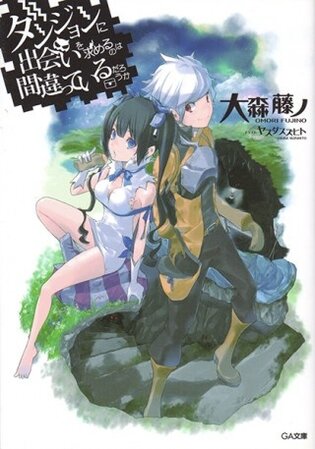
Is It Wrong to Try to Pick Up Girls in a Dungeon? (volumes 1-9)
Fujino Omori , Suzuhito Yasuda
SB Creative Corp.
PROFILE
Fujino Omori
Won the fourth GA Bunko Award in 2012 for web novel Familia Myth. Debuted as a commercial novelist in 2013 with Dungeon ni Deai wo Motomeru no wa Machigatteiru Darou ka (Is It Wrong to Try to Pick Up Girls in a Dungeon?). In 2014, he started to publish Dungeon ni Deai wo Motomeru no wa Machigatteiru Darou ka Gaiden: Sword Oratoria as a side story.
Source: SUGOI JAPAN

 Shopping Guide
Shopping Guide



